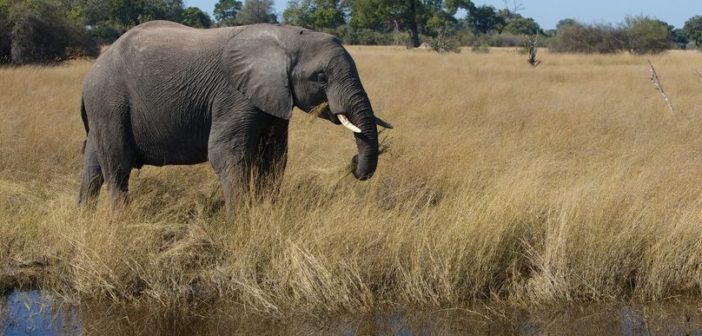A recent South African Parliamentary wildlife colloquium ignored the benefits of non-consumptive wildlife utilisation as ecological sustainability was obscured by the increasing commodification of wildlife resources.
In the first week of March 2018, South Africa’s Department of Environmental Affairs (DEA) hosted a public colloquium at Parliament titled “Unlocking the socio-economic potential of South Africa’s biodiversity assets through sustainable use of wildlife resources.” The meeting quickly turned into a rather one-sided pro-consumptive wildlife utilisation discussion.
According to Member of Parlaiment (MP) Mapulane, chairperson of the Portfolio Committee on Environmental Affairs, these public DEA colloquiums were created “as a platform for all contending views to be expressed and to engage in Parliament without taking one particular side.” However, it was very clear from the outset that the focus of this wildlife economy colloquium was on consumptive wildlife utilisation.
No NGOs or stakeholders were given a panel discussion session at the colloquium to present an alternative view. Michele Pickover, Director of the wild animal protection organisation EMS Foundation, voiced her concern that the “ethical and non-consumptive side of the discussion was completely silenced in the context of this colloquium. The discussion had mostly been about money and not conservation.”
Shonisani Munzhedzi, Deputy Director-General of Biodiversity and Conservation of DEA, defined the wildlife economy as a driver of rural development and prosperity through the sustainable use of wildlife assets, the socio-economic benefits of ecotourism, co-managed conservation areas, and use of related ancillary resources for secondary products that are consumed and traded domestically and internationally.
He stated that the current wildlife sector consists of three sub-sectors, wildlife ranching (breeding and live sale), wildlife activities (wildlife viewing, trophy hunting and biltong hunting), and wildlife products (game meat processing, skin and hide production and other products such as curio and decorations).
The sustainable non-consumptive wildlife economy, which has a proven track record of bringing sustainable livelihoods to rural communities, especially to those living in close proximity of protected areas, for example through eco-tourism activities and nature conservation, was sadly disregarded.
The focus of the only presentation that was supposed to shed light on the value of non-consumptive use of wildlife was changed at the last minute to what can only be described as a sales pitch by the Wildlife Biological Resources and Training Centre of Tshwane University of Technology.
Pickover also raised her concern on how “sustainable use” was being interpreted by the DEA, as a term that is highly debated and contested.
Munzhedi indicated that 18.7 million hectares (15.3%) of South Africa’s total land surface, often marginal land, is already occupied by wildlife ranching with significant potential for growth.
Xola Mkefe, Deputy Director-General of the DEA, said the aspiration of the Department was to promote an inclusive, sustainable and responsive wildlife economy that grows at 10% a year until at least 2030, while providing a foundation for social well-being and maintaining an ecological resource base. In terms of transformation, the aim of the sector is for 30% of wildlife businesses to be owned by previously disadvantaged individuals, and its sustainability goal is for 5 million hectares of non-protected areas to contribute towards the Aichi Conservation Target.
Subsequently, SANParks, Department of Agriculture, Forestry and Fisheries, Wildlife Ranching South Africa, SA Hunters and Game Conservation Association South Africa, Exotic Leather Cluster of South Africa, Black Business Council, and Matsila Community Development Trust were all given the podium to present at the colloquium.
Dr Harriet Davies-Mostert, Head of Conservation of the Endangered Wildlife Trust, stated “we recognise the critical importance of unlocking opportunities for job creation and poverty alleviation in South Africa and we believe that the wildlife economy has great potential to do this. We welcome the opportunity to engage with Parliament on this important matter.”
“We do, however, remain concerned that the principles of ecological sustainability have been obscured by the increasing commodification of our wildlife resources, as illustrated by several presentations delivered during the colloquium”, she continues. “It is our view that intensive wildlife production systems should not be evaluated solely on their socio-economic returns but should also demonstrate a net conservation benefit – thereby enhancing the persistence of wild, functioning wildlife populations.”
“We would welcome an opportunity to engage further with government and other role-players to define what we mean by the responsible and sustainable use of our country’s wildlife,” says Dr Davies-Mostert.
These concerns were echoed by other representatives from conservation and wildlife NGOs, who also felt the need for another colloquium to present an alternative perspective on economic transformation through eco-tourism and ethical conservation.
The Minister of Environmental Affairs Edna Molewa was in attendance, as were seven Portfolio Committee members representing the Democratic Alliance, African National Congress and Economic Freedom Fighters, and a range of public stakeholders.
Featured Image: Riverside reflection. Credit: Michael Lorentz, used under CC BY-YA 2.0.





